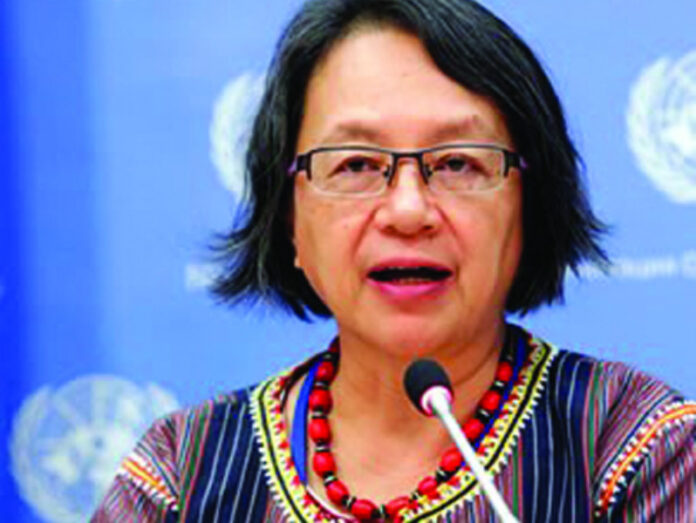The petition filed last month by the Philippine Department of Justice in the Manila Regional Trial Court could have been labeled as ridiculous and absurd if it were not for the fact that this document that lists more than 600 men and women as members of “terrorist groups” has put these people at very extreme risks of arrest and detention, extrajudicial killing or forced disappearance.
The Duterte government has essentially come up with a hit list or an order of battle that includes human right defenders, indigenous activists, former political prisoners, former elected officials, and members of the negotiating panel in the Peace Talks between the National Democratic Front and the Government of the Philippines. The accusations are definitely not funny; they are deadly and has condemned the people in this list to a terrible fate – if nothing is done.
The “terrorist” groups referred to are the Communist Party of the Philippines and the New People’s Army which President Duterte has proclaimed as such. Following this premise, Duterte also said that he would go after what he called the “legal fronts” of these groups. These so-called “legal fronts” are the progressive people’s organizations openly militant in calling for systemic changes to make possible that the Filipino people are able to live decent lives, work with living wages and with safe working conditions, enjoy the public services that they deserve like health and medical care nationwide, education and schools, housing, light and water, and that Filipino men and women are able to work decent jobs at home and if they are overseas, to be protected and supported by their consulates and embassies. They are critics and dissenters, they are organizers to protect the rights and welfare of the people
The Duterte government has accused Victoria Tauli – Corpuz who is the current United Nations Special Rapporteur on the Rights of Indigenous Peoples as a “terrorist”. Corpuz was also former Chairperson of the UN Permanent Forum on Indigenous Peoples and was former Secretary General of the Cordillera Peoples Alliance (CPA). Former House of Representatives member Satur Ocampo is also named in the list.
There are human rights defenders (46 as reported by the human rights organization KARAPATAN) that include Cordillera and the Lumad elders and activists; organizers from the women’s groups, environmental justice, peasant and worker sectors, from the lawyers and human rights workers across the country. Many of these activists are long-standing activists in organizations that have been around since the Marcos dictatorship. Some of these groups have also been labeled by Marcos, and those that came after him, as “terrorist” and we have seen the bloody results of this witch hunt.
This situation was brought to the attention of the United Nations Special Rapporteurs on the Situation of Human Rights in the Philippines and on the Rights to Freedom of Peaceful Assembly and of Association. The Guardian online newspaper reported that the UN High Commissioner for Human Rights Zeid Ra’ad Al Hussein was angered by the accusation that one of its Rapporteurs is a “terrorist” and hit back and said that Duterte needed a psychiatric evaluation.
Jose Maria Sison, also named in the list, reminded Duterte that governments before him have called Sison a “terrorist” but has forgotten that he is a recognized political refugee under the Refugee Convention and enjoys the protection of the European Court of Justice. This is the very same court that removed the name of Sison from the EU terrorist listing in 2009. The judicial system in the Netherlands also dismissed the “false” murder charges filed by then President Arroyo against him.
The International Coalition of Human Rights in the Philippines issued out its concern about the “terrorist” tagging of hundreds of Filipinos. In its March 11 statement that is circulating online, it said, “There are strong indications that Duterte’s red-tagging and anti-communist witch-hunting are instigated by the failing U.S. global war on terror and imperialist agenda in the Philippines. These follow the U.S. listing of “foreign terrorist organizations” since 2002 and, most recently, the inclusion of the Philippines, along with Operation Inherent Resolve in Iraq and Syria, in its new Overseas Contingency Operations dubbed Operation Pacific Eagle – Philippines, starting in October last year. The government petition cited “terrorist and outlawed organizations, associations and/or group of persons” pursuant to Section 17 of R.A. No. 9372 of The Human Security Act of 2007 patterned after the U.S. Patriot Act.”
The Coalition calls on the international community to denounce the Duterte government’s war against its very own people by asking them to urge their “governments to instruct their diplomatic missions in the Philippines to extend support and protection to the listed individuals as they will be facing risks to their lives and safety,” as well as to ”sanction and pull out loans, aid and support” to the Duterte government.”
Our own history of the Filipino people tells us that the various governments under Spain’s colonial rule, America’s occupation and colonial rule, to the subservient governments after so-called independence have consistently labeled dissenters, nationalists, activists as “filibusters”, “ladrones”, “bandits”, “tulisanes” ,“insurrectos”, “subversives”, “public order violators”, “reds”, and others. These Filipino men and women were hanged, exiled, garroted, shot, arrested, tortured, and detained, rendered missing for what they believed in, fought and stood for. We honor these men and women today as our heroes and heroines.
Now , “terrorist” has been added to that list of names. I hope that we know enough of our history as a Filipino people to understand the reasons for this modern name-calling and to ask ourselves who is the real terrorist.



